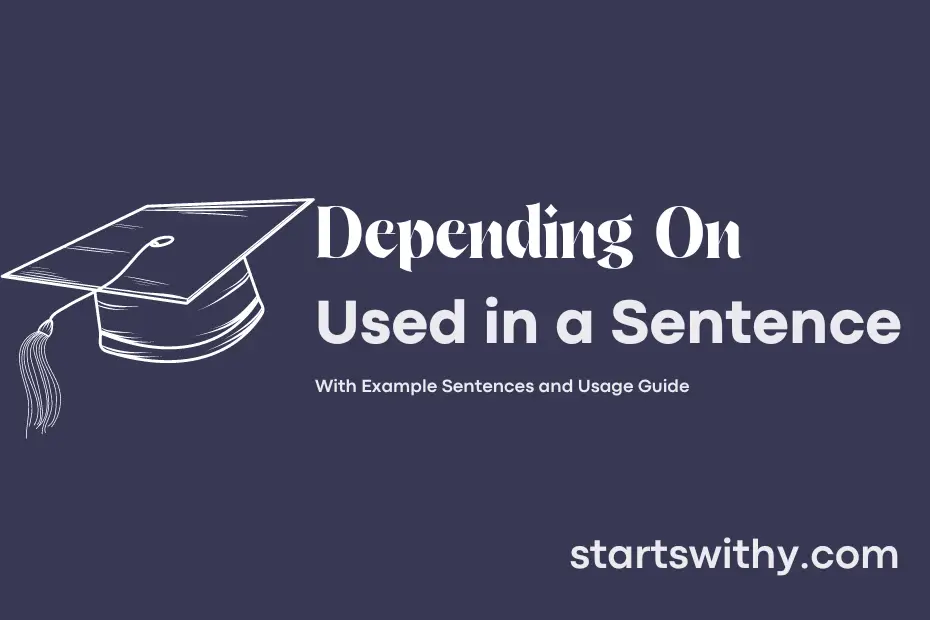Have you ever wondered how one small word like “depending on” can greatly impact the meaning of a sentence? Used to express conditions or possibilities, “depending on” plays a crucial role in showcasing variance and flexibility in the English language.
When “depending on” is present in a sentence, it indicates that the outcome or situation is not fixed but rather influenced by certain factors or circumstances. This phrase introduces an element of uncertainty or contingency, allowing for different possibilities to be considered depending on specific conditions.
7 Examples Of Depending On Used In a Sentence For Kids
- Dependng on the weather, we will play indoor or outdoor games.
- Depending on the time, we will have breakfast or lunch.
- We will wear different clothes depending on the season.
- Depending on our mood, we will watch a movie or play a game.
- We will eat different fruits depending on what is available in the market.
- Depending on the day, we will do different activities at school.
- We will use different colors depending on the picture we are coloring.
14 Sentences with Depending On Examples
- Depending on your grade point average, you may be eligible for different scholarships.
- As a college student, the time it takes to complete an assignment can vary depending on the subject.
- Depending on your career goals, you may need to pursue higher education after graduation.
- The availability of study materials can vary depending on the library’s collection.
- Depending on your schedule, you may want to consider taking evening classes.
- The cost of living in different cities can vary significantly depending on the area.
- Depending on the professor, the grading criteria for assignments may differ.
- The level of competition for internships can be intense depending on the industry.
- Depending on your area of study, you may have access to specialized equipment and facilities.
- The extracurricular activities offered on campus can vary depending on the size of the college.
- Depending on your financial situation, you may need to apply for student loans.
- The type of part-time job you can get may vary depending on the city you’re studying in.
- Depending on your major, you may have the opportunity to participate in research projects.
- The amount of free time you have depending on your course load and study habits.
How To Use Depending On in Sentences?
Depending On is a phrase commonly used to show that something is determined by a particular factor or circumstance. When using it in a sentence, there are a few things to keep in mind.
First, identify the subject or action that the outcome depends on. For example, “I will go for a swim depending on the weather.” Here, the decision to go for a swim is dependent on the weather.
Second, you can place depending on at the beginning or in the middle of a sentence. “Depending on how much time I have, I may finish the project today.” Or, “I may finish the project today, depending on how much time I have.”
Third, make sure that the two parts of the sentence are related and the connection is clear. For instance, “The success of the event is depending on our teamwork.” Here, the success of the event relies on teamwork.
Lastly, remember to use a comma before and after depending on when it is placed in the middle of a sentence. This helps in separating the clause that specifies what the outcome depends on.
In conclusion, depending on is a useful phrase to indicate that a particular result is determined by specific conditions or circumstances. By following these guidelines, you can effectively use this phrase in your writing.
Conclusion
In conclusion, the outcome or result of a situation can vary significantly depending on the circumstances at hand. The success of a project, the choice of action to take, or even the interpretation of data can all differ based on the conditions present. For example, the effectiveness of a new marketing strategy may vary depending on the target audience and market trends. Similarly, the accuracy of scientific findings can be contingent on the methodology used and the variables considered.
It is essential to recognize that outcomes are not always absolute, as they are often influenced by a range of factors. Understanding that results can change depending on specific conditions allows for greater flexibility in decision-making and a more nuanced approach to problem-solving. Recognizing the role of variability in outcomes empowers individuals to adapt and adjust their strategies accordingly to achieve more favorable results.



